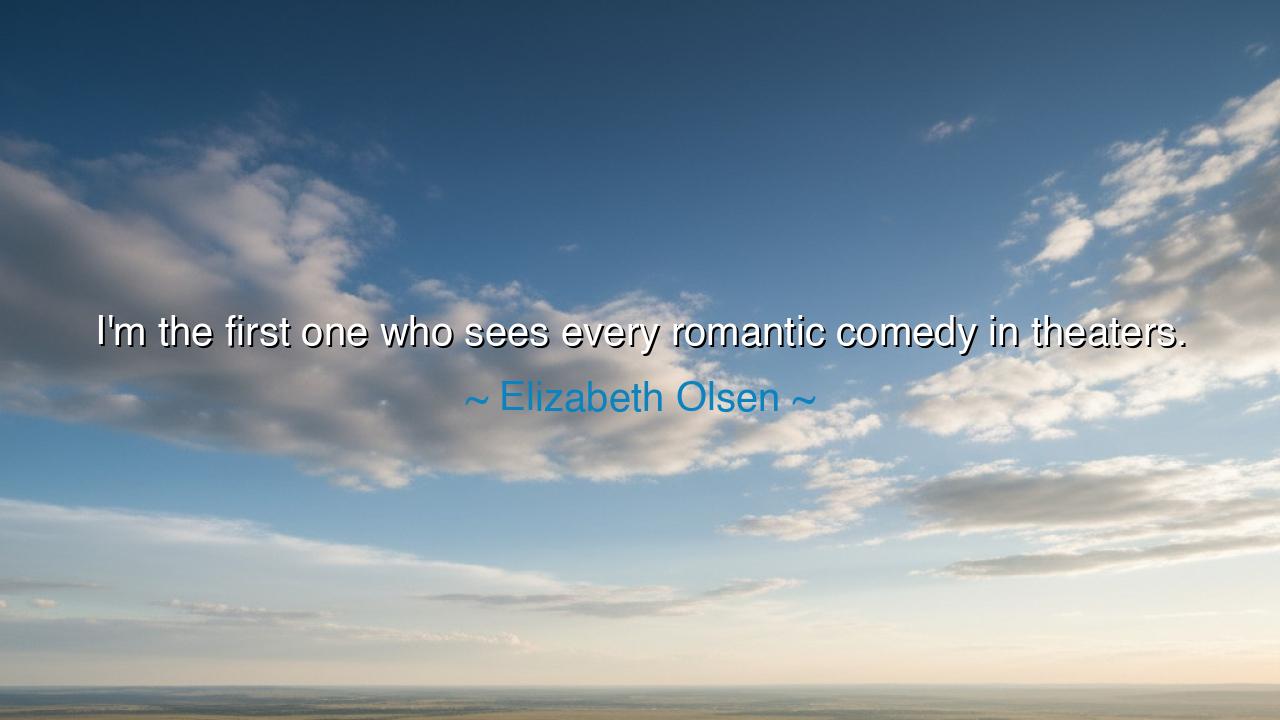
I'm the first one who sees every romantic comedy in theaters.






Hear the words of Elizabeth Olsen, spoken with a kind of tender joy: “I’m the first one who sees every romantic comedy in theaters.” What may sound like a playful admission is, in truth, a glimpse into the human longing for stories of love, hope, and laughter. In these words lies the confession of one who delights in watching love unfold, who rushes to witness the simple beauty of connection, and who finds in such films not mere entertainment, but nourishment for the heart.
The romantic comedy has long been the storyteller’s gift to a weary world. It is not about battlefields or empires, but about the eternal quest of two souls to find each other. These stories reassure us that amidst chaos and misunderstanding, love will prevail, laughter will return, and life will end not in tragedy but in union. Olsen’s eagerness to be the “first one” in the theater shows how deeply such stories resonate—they speak to a need that lies at the core of humanity: the need to believe that love, however elusive, can still triumph.
This tradition is not new. In the plays of Shakespeare, the people of Elizabethan England flocked to see Much Ado About Nothing and Twelfth Night—tales where wit and folly, disguise and misunderstanding, always ended in joy and reconciliation. The crowds came not only to laugh, but to be reassured: that life, too, might hold such happy turns. The romantic comedy, whether in the 16th century or in modern cinema, offers this promise of hope. To embrace it eagerly, as Olsen does, is to embrace the belief that love remains possible, and that joy can be renewed.
Consider also the power of these films in times of sorrow. During the Great Depression, when despair shadowed countless lives, people filled the theaters not only for newsreels or dramas, but for comedies and romances that offered escape, yes, but also courage. They saw on the screen what they longed for in their lives: laughter after hardship, love after loneliness. The art of the romantic comedy has always carried with it this quiet strength: to whisper to those in darkness that light is still waiting.
Olsen’s words remind us that to seek out such stories is not foolishness, but wisdom. Cynicism may scoff at the simplicity of romance and laughter, but the heart knows better. It knows that joy and tenderness, though fragile, are treasures worth protecting. To watch a romantic comedy is not to deny reality, but to strengthen the spirit, to remind oneself that life is not only struggle and sorrow. It is also filled with moments of laughter, of connection, of sweetness that sustains the soul.
The lesson for us is this: do not despise the small joys that give you hope. If a film, a story, or a song fills your heart with warmth, do not call it trivial—embrace it. Seek out the romantic comedy in your own life: in gestures of kindness, in shared laughter, in the courage to hope when hope feels fragile. These are not foolish pursuits, but the very things that carry us through the weight of existence.
Therefore, children of tomorrow, follow Elizabeth Olsen’s example. Be eager to witness love in its many forms. Fill your heart with stories that make you laugh and remind you of tenderness. Let not the world harden you to joy, nor convince you that romance is childish. For the heart that delights in love’s stories will never grow cold, and the soul that welcomes laughter will never despair for long.
Thus Olsen’s light-hearted confession becomes timeless counsel: the one who rushes to see every romantic comedy is the one who knows that the greatest stories are not those of conquest or destruction, but those of love, laughter, and the fragile, eternal hope of the human heart.






AAdministratorAdministrator
Welcome, honored guests. Please leave a comment, we will respond soon